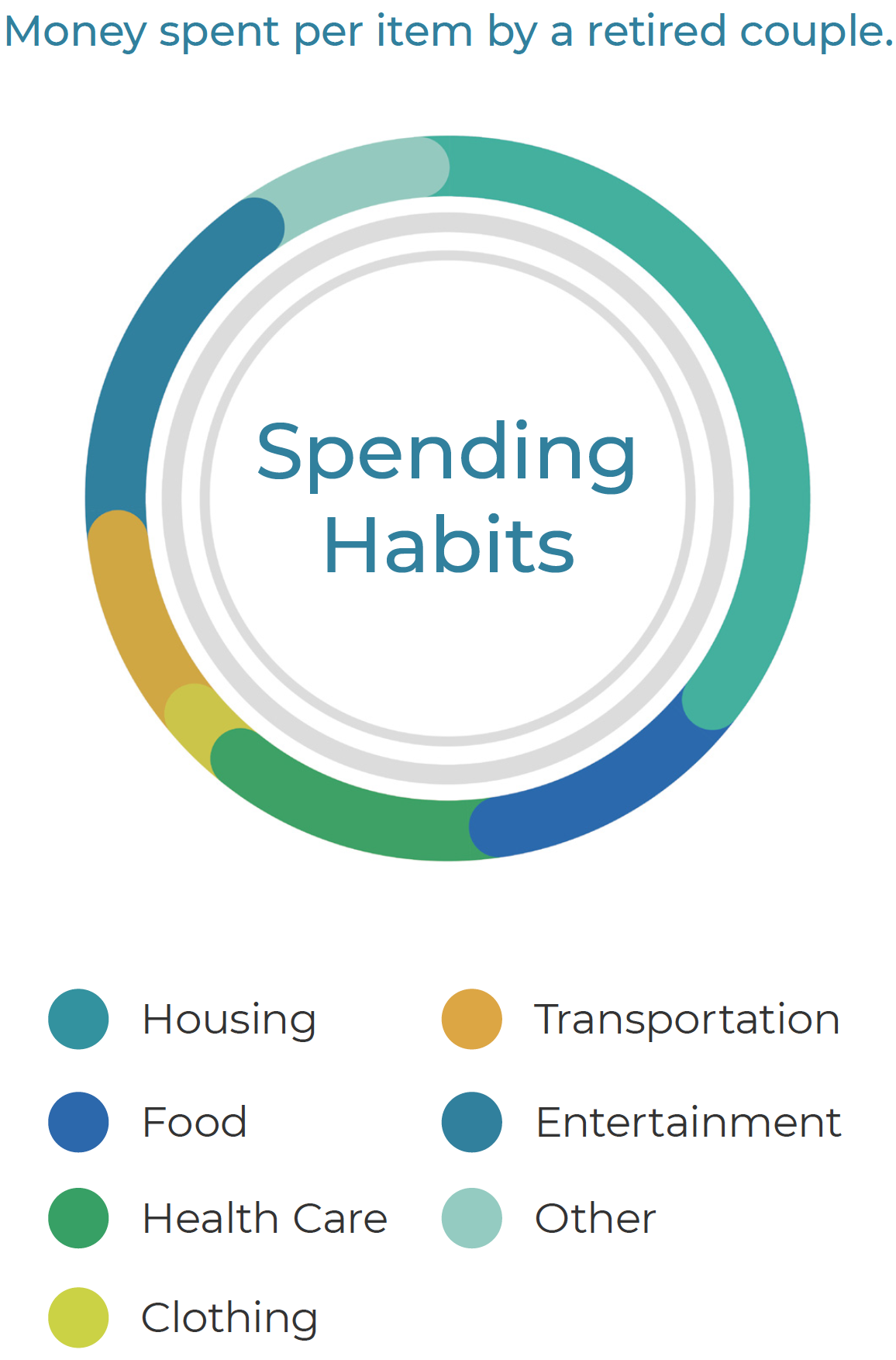Today’s retirees are living longer than ever before and experiencing retirement in new ways.
Gone are the days when people worked 50 years for the same employer, retired on a predictable pension, and settled down into a quiet lifestyle.
Today’s retirees are more active—with baby boomers controlling 70% of the country’s disposable income. They’re traveling the world, learning new skills, and redefining what creates a retirement community. With 10,000 boomers retiring daily, this drive to enjoy a vibrant retirement is becoming more common.1,2
In addition, pre-retirees appear to feel more confident about retirement than in years past, with two-thirds saying in a 2019 EBRI survey that they believe they can retire comfortably. One approach to maintaining confidence in retirement is to assess your needs, look ahead, and prepare for both the known and unknown.3
While you can’t be certain what the future holds, you can strategize for the retirement life you want—and take these five steps to help you get there with confidence.

Step 1
Calculate Your Actual Costs
Only 42% of pre-retirees calculate a budget for retirement. Knowing how much money you need is critical when forming a retirement strategy.4
If you don’t identify your actual retirement costs, you risk leaving yourself without the necessary income to cover your expenses. Were you to find yourself in that gap, you might need to adjust your lifestyle.
You can build financial strategies that may help you become more confident by knowing how much your retirement might cost and identifying many of the expenses you can anticipate. Here are some questions to ask as you create your budget:
How much are my living costs?
Expenses can add up quickly in retirement. On average, households run by people who are 65 years and older spend about $3,800 each month.5
To identify your costs, list every dollar you spend to support your daily living needs, from your transportation to your food. Pay particular attention to any expenses that you might be able to eliminate from your budget.
What are my health care costs?
Healthcare expenses are the second-highest financial priority among retirees. A retired couple should prepare to spend $285,000 or more to cover expenses during their retirement years. A single man should prepare for $135,000, and a single woman, for $150,000.6
One choice that can help retirees prepare for health care is investing in a Health Savings Account (HSA). An HSA isn’t insurance, but it does provide a tax-advantaged savings account to which you, and potentially, your employer, can make contributions over time. You can use these funds to pay for most medical expenses, including prescription drugs, dental care, and vision care.
Keep in mind: If you spend your HSA funds on nonmedical expenses before age 65, it may be necessary to pay ordinary income tax as well as a 20% penalty. After age 65, you can take money out without the 20% penalty, but it may become taxable income. HSA contributions are exempt from federal income tax, but they are not exempt from state taxes in certain states.
What income will I have?
Income can come from a variety of sources, such as retirement accounts, pensions, part-time work, Social Security, and other sources. The Employee Benet Research Institute, in its 2019 survey, found that retired couples can expect to spend 86% of their pre-retirement income each year of retirement.7
Step 2
Control Debt
Some retirees are choosing to retire with debt. For those who are 75 years and older, debt has increased by almost 60% since 2007.8
Today’s retirees are much more likely to have these liabilities than any generation before them. The average debt for families led by someone 55 years and older is $76,679.8
Debt can play a role in any financial strategy, but it’s critical to understand its benefits and limitations, especially in retirement.
Step 3
Create Income Stability
Start your retirement strategy by calculating your actual costs and creating a working budget.9
Put together lists of both the sources of your funds as well as where you are directing those funds. Without a clear look at your income and where you are directing it, you might lose sight of your budget and find maintaining your lifestyle more challenging.
For 66% of retirees, Social Security benefits will be their primary income source. The average monthly payout is $1,461.9
When strategizing income stability, you should consider having diverse sources of income designed to last the rest of your life. Work with a trusted financial professional to help you identify income needs. Only 27% of retirees take this potentially helpful step.10 The amount of income you may require varies from person to person, since different lifestyle choices, health care expenses, and other personal details may drive your budget.
Step 4
Build Your Savings
Here’s a retirement reality check: In a 2019 survey by Alliance for Lifetime Income, the majority of Americans responded that they are anxious that their savings will not last their retirement.11 While we’re feeling more confident about retirement, money issues are still a worry.
On average, you’ll want to prepare for $738,400 in total costs for retirement. For many, that’s a staggering amount of money. These costs may include Social Security payments, with the balance coming from a possible combination of retirement accounts and private savings.12
Many people say that they expect to rely on their employer-provided savings to be a vital source of retirement income. It’s no surprise to see that those who have employer-sponsored plans have the highest levels of retirement confidence. In cases where they also have a
spouse with such a plan, feeling “somewhat confident” in their retirement increases.13
Step 5
Continue Working
While many people think of retirement as a time when they’ll stop working for others, continuing to work is part of their overall strategy.
Nearly 30% of baby boomers say that they plan to either keep working—or not retire at all.15
No matter whether you are preparing to work, here are some benefits that working can bring your retirement:
The Takeaway
Creating a strategy for retirement is essential. Only you know what a fulfilling retirement means for you, and today is a perfect time to take steps toward the life you envision. By calculating your costs, getting ahead of your savings, and working with a professional, you may set yourself up to retire comfortably—and confidently.
Remember, if you have any financial questions, we can help you navigate a complicated retirement landscape and collaborate with your legal and tax professionals. We believe that retiring is an opportunity to realize your best life, and we’re here to help you make that vision a reality.

Download PDF Version
5 Ways to Stay Confident in Retirement
1MediaPost.com
2National Council on Aging
3Employee Benefit Research Institute
4Employee Benefit Research Institute
5Marketwatch.com
7Employee Benefit Research Institute
8Employee Benefit Research Institute
6Barron’s
9TransAmerica Center for Retirement Studies
10TransAmerica Center for Research Studies
11Alliance for Lifetime Income
12MarketWatch.com
13Employee Benefit Research Institute
14CNN.com
15Motley Fool
16TransAmerica Center for Retirement Studies



